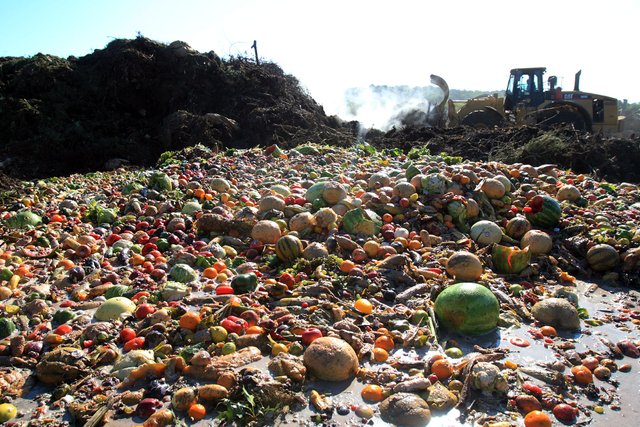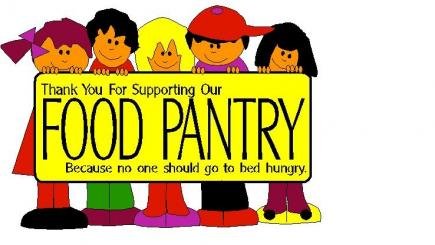The Social Problem of Food Insecurity in the US
According to the USDA, 4.9% of the US population experienced food insecurity in 2016 (Coleman-Jensen, et al, 2017).
Food insecurity is defined as not having physical, sociological, or economic access to adequate, nutritional food (FAO, UN. 2003). Sociological explanations deal largely with inherent designs within the system which contribute to problems in a society. Some of the sociological reasons that food insecurity exists are the uneven distribution of foods, and how we deal with waste.

SRC
The distribution of food is one of many resources which tends to go with the flow of money.
According to data gathered by Feeding America, a non-profit organization which focuses on issues around hunger, the areas with the most GDP generally tends to have the least concentration of food insecurity (FA 2016). With capitalism being the main economic system in the US, the distribution of food is inevitably bound to end up in the places which can afford to pay for it. Companies do not want to risk losing money by paying for the driver, the gas, and more to distribute food to areas where there is no profit to be accrued. Even as these items are distributed to the shelves they do find themselves in, the methods in which we treat our waste also contributes to food insecurity.
A common belief that is held today is that there is not enough food to be distributed; however, scarcity is not the case but rather how we deal with our waste in the US.
40% of food a day is wasted and thrown away (Dana Grunders 2012: 1). “In-store food losses in the United States totaled an estimated 43 billion pounds in 2008, equivalent to 10 percent of the total food supply at the retail level” (Grunders: 10). Grocery stores throw out large quantities of edible food in order to keep up an appearance of fresh, pristine products. Products which are blemished or malformed are regularly discarded before the consumer can ever set eyes on them. Reducing food waste by just 15% would produce enough food to feed every American each year (Grunders: 10). Programs within the community which work with retailers to distribute this food to those who need it has a large impact on reducing food insecurity.

SRC
The Oregon Food Bank has a program that has been running for 17 years which partners with grocery agencies across Oregon in order to divert food that is close to its expiration and “ugly food” from landfills to hungry people’s plates.
Since its creation in 2001, OFB has successfully distributed over 80 million pounds of food (OFB 2016). Programs like this help not only those in need of food, but the donating companies benefit as well. These companies receive tax breaks for donating, reduce their dumping fees, reduce their storage fees, and more (OFB 2016). Distribution of the food to places which have a high poverty rate is a big goal of OFB.
As it was stated earlier, the distribution of food is mostly concentrated in areas of high income, thus finding ways to successfully deliver food to places which are experiencing food insecurity has been a top priority of the Oregon Food Bank.
“Oregon Food Bank offers hunger relief by distributing food through a Statewide Network of 21 Regional Food Banks and approximately 970 partner agencies in Oregon & Clark County, WA” (OFB 2016). The OFB’s main priority is to receive, repackage, and deliver goods to as many different locations as possible. The OFB does very little direct distribution of goods but rather acts as an umbrella in order to be the most efficient in its reach. The OFB is making direct and meaningful impacts on reducing food insecurity by expanding its potential to distribute goods to impoverished areas.
The uneven distribution of foods, and the manner in which our society deals with waste are sociological problems which contribute to hunger in the US.
Capitalism controls the flow of goods and puts demand on retailers to keep up an illusion of perfection which creates large amounts of waste. The Oregon Food Bank has equipped itself to accept this wasted food and distribute goods fairly to the areas which need them the most. While the OFB is not an end-all-fix-all, it is a major contributor in reducing hunger and food insecurity in Oregon while also acting as an iconic pillar for other organizations to replicate.

SRC
Work Cited
Anon. 2003. “Chapter 2. Food Security: Concepts and Measurement[21].” fao.org.
Retrieved June 5, 2018 (http://www.fao.org/docrep/005/y4671e/y4671e06.htm).
Anon. 2016. “Map the Meal Gap.” Feeding America. Retrieved June 5, 2018
(http://map.feedingamerica.org/).Anon. 2016. “Oregon Food Bank.” Oregon Food Bank. Retrieved June 5, 2018 (https://www.oregonfoodbank.org/).
Coleman-Jensen, Alisha, Matthew P. Rabbitt, Christian A. Gregory, and Anita Singh.
n.d. “Household Food Security in the United States in 2016.” USDA ERS - Sharing the Economic Burden: Who Pays for WIC's Infant Formula. Retrieved June 5, 2018 (https://www.ers.usda.gov/publications/pub-details/?pubid=84972).
Grunders, Dana. 2012. “Wasted: How America Is Losing Up to 40 Percent of Its Food
from Farm to Fork to Landfill .” NRDC Issue Paper 1–10.
Semega, Jessica L. 2017. “Income and Poverty in the United States: 2016.” U.S. Trade
with Haiti. Retrieved June 5, 2018
(https://www.census.gov/library/publications/2017/demo/p60-259.html).
Sparks and Andrea. 2008. “UO Libraries.” Scholars' Bank Home. Retrieved June 5,
2018 (https://scholarsbank.uoregon.edu/xmlui/handle/1794/7863).
Join us in The Philoso-Forum to discuss philosophy and the occult arts with likeminded individuals!
LOVELAUGHTER&&XHAOS
Loser of Found Souls, Temple of Appled Thought
Erisian Ataxia Troupe : Caste of the Black Sun

Surprisingly for me, I learn that EE. UU It has serious threats regarding food. I live in Venezuela and, as everyone surely knows, we have a very serious food problem and also with medicines ... Seeing that a world power also has social problems due to food insecurity leaves me with my mouth open in amazement. In the case of Venezuela, three are, in my opinion, the main causes: 1.-There are not even remotely enough food production in the national territory so even the most basic is imported. 2.-The private distribution channels only think about they excessive profit, without caring that the majority can not buy them. 3.-The armed force, true power over the political class, controls the public channels of distribution but does so for proselytizing purposes and, above all, for illegal enrichment. It would be interesting to investigate if, deep down and although it seems incredible, they could not be the same causes although the circumstances, obviously, are very different ... In other words, in the case of the United States. as in Venezuela, as well as other nations, food is increasingly becoming an important strategy of social control in hands of the Dark power that never shows it true face.
I am also Venezuelan and I don't think Venezuela can be compared with USA.
As many Venezuelans I have family in America and they all can buy food very easily in there. Food in America is one of the cheapest things anyone can buy, and this happens not only in America but in pretty much every developed country.
In my opinion, in the developed countries, there has never been as much food as nowadays, Venezuela of course, is a totally different case because of the socialist revolution.
I watched a documentary that covered a lot of these current issues and I was surprised how much food is thrown away simply because it doesn't meet someone's visual standards. Even a strawberry farmer was throwing away close to 50% of their produce because they knew the grocers would not accept them if they looked even a little deformed.
Someone stepped in and created an initiative that encouraged the farmers to still send the "ugly" food to the grocers where they were sold at a major discount to buyers who didn't mind.
Well researched and well written. Awesome work.
What do you mean with that? The food is distributed according to the market as far as I understand.
I sense there is an intent to criticize capitalism? It is important to notice that with countries that reject a market economy, there is simply not enough food like what is happening in Venezuela these last few years.
I agree there is too many waste, but that is hard to fix. People simply throw away food they don't need, and convincing them to stop doing it might be difficult, but still we should try to do it.
America more than a hunger problem has a obesity problem, because fast food is cheap and a lot of people decide to eat those. For real hunger problem we could check other countries, like Venezuela.
I don't think it is perfect, not even close, but free market economies are much better than state controlled economies like the one in Venezuela. A person in america has a higher purchasing power having a basic job, than working as a professional in Venezuela.
What I mean by the uneven distribution of foods is exactly what it says, the unequal dispersal of goods to the entire US populace. Food deserts exist all across the country where people have no access to adequate foods. Even for myself living in a city I have to drive 20 minutes (or an hour bus ride) in order to get a large selection of quality produce.
The intent is not to criticize Capitalism, the statement is a fact. There are countless studies which show that goods follow the net capital gains within a Capitalist economy.
The obesity problem you bring up has a lot to do with the unequal distribution of foods. Without access to healthy foods, both economically and sociologically, people consume large amounts of processed foods. Processed foods have a direct correlation with type II diabetes and obesity.
You keep comparing the US to other countries when this study has nothing to do with external comparisons. Yes, other countries are worse off, but that does not negate the issues we experience in our own borders.
I never said it was perfect, I said they try to keep up an illusion of perfection, which they do. They throw away any goods that do not meet their aesthetics standards so it must be perfect.